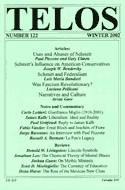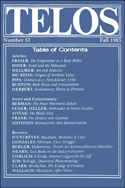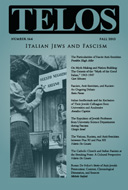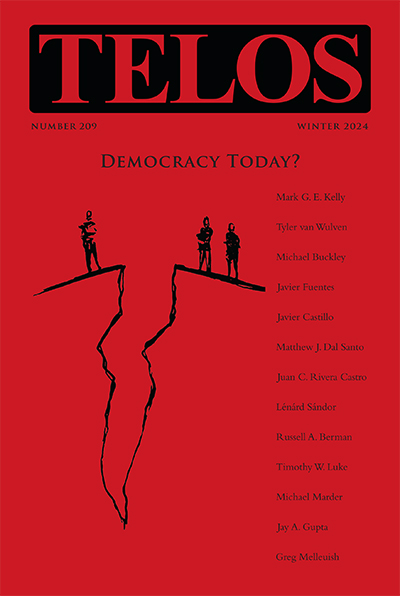By Michael Millerman · Tuesday, August 12, 2014  Like Spinoza, many liberal thinkers have defined the liberty they promote in terms of the necessity of submitting to the law that guarantees it. This is a unique kind of rule of law, a rule of the “‘politically correct,’ universalist, managerial-liberal” (9) law of contemporary liberals. Both internationally and domestically, this law requires the muscular imposition of questionable political, moral, and economic principles, by means of an insidious and often nauseating bureaucratic, technocratic, mediacratic apparatus, onto largely unwilling publics. Crucially, the freedom championed by such liberals and allegedly secured by their law does not include the freedom to refuse their domination root and branch. Like Spinoza, many liberal thinkers have defined the liberty they promote in terms of the necessity of submitting to the law that guarantees it. This is a unique kind of rule of law, a rule of the “‘politically correct,’ universalist, managerial-liberal” (9) law of contemporary liberals. Both internationally and domestically, this law requires the muscular imposition of questionable political, moral, and economic principles, by means of an insidious and often nauseating bureaucratic, technocratic, mediacratic apparatus, onto largely unwilling publics. Crucially, the freedom championed by such liberals and allegedly secured by their law does not include the freedom to refuse their domination root and branch.
Continue reading →
By Matt Applegate · Tuesday, May 6, 2014 As an occasional feature on TELOSscope, we highlight a past Telos article whose critical insights continue to illuminate our thinking and challenge our assumptions. Today, Matt Applegate looks at Arshi Pipa’s “Gramsci as a (Non) Literary Critic” from Telos 57 (Fall 1983).
 Arshi Pipa’s “Gramsci as a (Non) Literary Critic” is more than a short biography and description of Antonio Gramsci’s inquiries into literary criticism. It also provokes the reader to meditate on the political conditions of literary criticism as an intellectual practice. Gramsci is a controversial figure in the history of literary criticism for at least two reasons, according to Pipa. First, his political work remains more prominent than his literary criticism. When one thinks of Gramsci as a writer and historical figure, his literary criticism might not even register, given his political writing and influence. Second, Gramsci’s politics serve as the impetus for his intellectual projects, thus also providing potential grounds to dismiss or ignore his aesthetic analyses. To be sure, Gramsci is a controversial political figure. In 1921 Gramsci co-founded and led the Communist Party of Italy in opposition to fascism, and was later arrested by fascist police under Mussolini, ultimately dying in prison in 1937. Perhaps his most famous collection of writings, Prison Notebooks, was completed while he was incarcerated between 1926 and 1937. Yet, it is precisely Gramsci’s controversial style and political will that draw Pipa to his work and allow him to question literary criticism as an enduring intellectual practice. Arshi Pipa’s “Gramsci as a (Non) Literary Critic” is more than a short biography and description of Antonio Gramsci’s inquiries into literary criticism. It also provokes the reader to meditate on the political conditions of literary criticism as an intellectual practice. Gramsci is a controversial figure in the history of literary criticism for at least two reasons, according to Pipa. First, his political work remains more prominent than his literary criticism. When one thinks of Gramsci as a writer and historical figure, his literary criticism might not even register, given his political writing and influence. Second, Gramsci’s politics serve as the impetus for his intellectual projects, thus also providing potential grounds to dismiss or ignore his aesthetic analyses. To be sure, Gramsci is a controversial political figure. In 1921 Gramsci co-founded and led the Communist Party of Italy in opposition to fascism, and was later arrested by fascist police under Mussolini, ultimately dying in prison in 1937. Perhaps his most famous collection of writings, Prison Notebooks, was completed while he was incarcerated between 1926 and 1937. Yet, it is precisely Gramsci’s controversial style and political will that draw Pipa to his work and allow him to question literary criticism as an enduring intellectual practice.
Continue reading →
By Telos Press · Monday, October 21, 2013  On Saturday, October 26, the Telos-Paul Piccone Institute and the Centro Primo Levi will host a panel discussion on Telos 164: Italian Jews and Fascism. The discussion will be held at Casa Italiana Zerilli Marimò, 24 West 12th Street, in New York City, from 1 pm to 4pm. Following the discussion, there will be a cocktail reception that will include Maria Piccone’s delicious “amaretti” cookies, in honor of Telos‘s 45th Anniversary. We hope to see you there! On Saturday, October 26, the Telos-Paul Piccone Institute and the Centro Primo Levi will host a panel discussion on Telos 164: Italian Jews and Fascism. The discussion will be held at Casa Italiana Zerilli Marimò, 24 West 12th Street, in New York City, from 1 pm to 4pm. Following the discussion, there will be a cocktail reception that will include Maria Piccone’s delicious “amaretti” cookies, in honor of Telos‘s 45th Anniversary. We hope to see you there!
Continue reading →
By Telos Press · Monday, October 14, 2013  On Saturday, October 26, the Telos-Paul Piccone Institute and the Centro Primo Levi will host a panel discussion on Telos 164: Italian Jews and Fascism. The discussion will be held at Casa Italiana Zerilli Marimò, 24 West 12th Street, in New York City, from 1 pm to 4pm. We hope to see you there On Saturday, October 26, the Telos-Paul Piccone Institute and the Centro Primo Levi will host a panel discussion on Telos 164: Italian Jews and Fascism. The discussion will be held at Casa Italiana Zerilli Marimò, 24 West 12th Street, in New York City, from 1 pm to 4pm. We hope to see you there
Continue reading →
By Franklin Hugh Adler · Monday, September 23, 2013 Telos 164 (Summer 2013) is now available for purchase in our store.
 When we examine European anti-Semitism during the 1930s, and especially the Shoah, the case of Germany looms so large that the Nazi regime immediately appears as the paradigmatic form of fascism and the manifold policies directed against European Jewry during the 1930s little more than German racial policy writ large. Without in any way trivializing or, worse, relativizing in an ethical sense the German case, one might nevertheless suggest that it occupies too much conceptual space and occludes a more precise comparative understanding of other European cases where anti-Semitic policies had been autonomously generated, relatively independent of direct Nazi pressure. In this sense, decentering the German case might be a necessary first step toward a less encumbered perspective on what happened elsewhere. When we examine European anti-Semitism during the 1930s, and especially the Shoah, the case of Germany looms so large that the Nazi regime immediately appears as the paradigmatic form of fascism and the manifold policies directed against European Jewry during the 1930s little more than German racial policy writ large. Without in any way trivializing or, worse, relativizing in an ethical sense the German case, one might nevertheless suggest that it occupies too much conceptual space and occludes a more precise comparative understanding of other European cases where anti-Semitic policies had been autonomously generated, relatively independent of direct Nazi pressure. In this sense, decentering the German case might be a necessary first step toward a less encumbered perspective on what happened elsewhere.
Continue reading →
By Russell A. Berman · Wednesday, September 6, 2006 The process by which the Nazis rapidly removed potential regime opponents from the universities and the civil service came to be known as Gleichschaltung. Sometimes translated as “coordination,” the term is much harsher: all concerned are made the same, arranged in a single order, forced into uniformity. All that is different is made identical, and that which is non-identical is eradicated
The Associate Press now reports that Iranian President Ahmadinejad has called for a purge of secular and liberal faculty from the universities. In fact, precisely such a purge of liberals and leftists took place in the wake of the Islamic Revolution of 1979—which makes it even more curious that parts of the western left somehow still look to Iran as a positive anti-imperialist force—but some reformist elements have later reemerged. The current call for renewed attacks on intellectuals indicates an effort to amplify the regime’s extremist position. It surely shatters any hope that the recent release from prison of critical intellectual Ramin Jahanbegloo (discussed here on August 31) would initiate a liberalization.
Continue reading →
|
|
 Like Spinoza, many liberal thinkers have defined the liberty they promote in terms of the necessity of submitting to the law that guarantees it. This is a unique kind of rule of law, a rule of the “‘politically correct,’ universalist, managerial-liberal” (9) law of contemporary liberals. Both internationally and domestically, this law requires the muscular imposition of questionable political, moral, and economic principles, by means of an insidious and often nauseating bureaucratic, technocratic, mediacratic apparatus, onto largely unwilling publics. Crucially, the freedom championed by such liberals and allegedly secured by their law does not include the freedom to refuse their domination root and branch.
Like Spinoza, many liberal thinkers have defined the liberty they promote in terms of the necessity of submitting to the law that guarantees it. This is a unique kind of rule of law, a rule of the “‘politically correct,’ universalist, managerial-liberal” (9) law of contemporary liberals. Both internationally and domestically, this law requires the muscular imposition of questionable political, moral, and economic principles, by means of an insidious and often nauseating bureaucratic, technocratic, mediacratic apparatus, onto largely unwilling publics. Crucially, the freedom championed by such liberals and allegedly secured by their law does not include the freedom to refuse their domination root and branch.  Arshi Pipa’s “Gramsci as a (Non) Literary Critic” is more than a short biography and description of Antonio Gramsci’s inquiries into literary criticism. It also provokes the reader to meditate on the political conditions of literary criticism as an intellectual practice. Gramsci is a controversial figure in the history of literary criticism for at least two reasons, according to Pipa. First, his political work remains more prominent than his literary criticism. When one thinks of Gramsci as a writer and historical figure, his literary criticism might not even register, given his political writing and influence. Second, Gramsci’s politics serve as the impetus for his intellectual projects, thus also providing potential grounds to dismiss or ignore his aesthetic analyses. To be sure, Gramsci is a controversial political figure. In 1921 Gramsci co-founded and led the Communist Party of Italy in opposition to fascism, and was later arrested by fascist police under Mussolini, ultimately dying in prison in 1937. Perhaps his most famous collection of writings, Prison Notebooks, was completed while he was incarcerated between 1926 and 1937. Yet, it is precisely Gramsci’s controversial style and political will that draw Pipa to his work and allow him to question literary criticism as an enduring intellectual practice.
Arshi Pipa’s “Gramsci as a (Non) Literary Critic” is more than a short biography and description of Antonio Gramsci’s inquiries into literary criticism. It also provokes the reader to meditate on the political conditions of literary criticism as an intellectual practice. Gramsci is a controversial figure in the history of literary criticism for at least two reasons, according to Pipa. First, his political work remains more prominent than his literary criticism. When one thinks of Gramsci as a writer and historical figure, his literary criticism might not even register, given his political writing and influence. Second, Gramsci’s politics serve as the impetus for his intellectual projects, thus also providing potential grounds to dismiss or ignore his aesthetic analyses. To be sure, Gramsci is a controversial political figure. In 1921 Gramsci co-founded and led the Communist Party of Italy in opposition to fascism, and was later arrested by fascist police under Mussolini, ultimately dying in prison in 1937. Perhaps his most famous collection of writings, Prison Notebooks, was completed while he was incarcerated between 1926 and 1937. Yet, it is precisely Gramsci’s controversial style and political will that draw Pipa to his work and allow him to question literary criticism as an enduring intellectual practice.  On Saturday, October 26, the Telos-Paul Piccone Institute and the
On Saturday, October 26, the Telos-Paul Piccone Institute and the 

